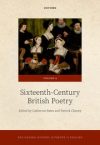Our professionally active Renaissance faculty take diverse approaches to the study of Renaissance literature and culture. Their courses and scholarship examine both canonical and non-canonical authors and texts, and explore such topics as authorship and anonymity, intertextuality, book history, the histories of embodiment and cognition, manuscript and print culture, race, visual culture and women writers.
Recent Courses
- Shakespeare
- Cognition, Passion and Embodiment in English Renaissance Drama
- Spenser and the Making of English Renaissance Authorship: Nationhood and the Sublime
- The Human and Its Discontents in English Renaissance Literature
- Seventeenth-Century Women Writers in England & Early America
- Race and Travel in Sixteenth-Century Poetry & Prose
- Shakespeare & Twentieth Century Cultural Politics
- Spenser & Marlowe: Theories of Imitation, Intertextuality, and Poetic Rivalry
- Historicizing Milton
- Shakespeare & the Limits of Comedy
- Women Writers, Julian of Norwich to Mary Wollstonecraft
- Milton & Popular Culture
- The Culture of Manuscripts in Early Modern England
Early Period Studies Reading Group
Faculty and graduate students in early periods (medieval to 18th-century) gather regularly to discuss texts suggested by the group members, read plays aloud, and attend theatrical productions. The reading group offers a pleasant, intellectually stimulating atmosphere for scholarly conversation. People argue vigorously but constructively and mingle amicably, whatever their critical or theoretical differences.
Scholarly Resources at the Penn State Library
The Penn State Library, which provides access to Early English Books Online, the Chadwyck-Healey English Drama and Poetry databases, the World Shakespeare Bibliography, and other holdings, is an excellent resource for the study of early modern literature.
Folger Shakespeare Library Membership
Penn State is a member of the Folger Institute consortium, which gives our students and faculty access to the Folger Shakespeare Library in Washington, D.C. Less than four hours away, the Folger is home to the world’s largest and finest collection of Shakespeare materials and to major collections of other rare Renaissance books, manuscripts, and works of art. Because Penn State belongs to the Folger Consortium, our students are able to utilize the collections and regularly take courses with distinguished faculty from across the globe.
Graduate Faculty
with particular interest in early modern drama; Shakespeare; book history; bibliography; typography; theater studies; textual editing
with particular interest in Spenser, Marlowe, and Shakespeare, literary intertextuality, authorship, classical reception in the Renaissance, and textual editing.
Early modern literature and culture from the Reformation to the Restoration; Milton and his contemporaries; literature in relation to politics and religion; book history and textual studies; Shakespeare; Renaissance intellectual history.
with particular interest in authorship, book history, manuscript culture, lyric poetry, and early women's literature
with particular interest in Renaissance drama, especially Shakespeare and Marlowe, embodiment and cognition, and early modern cartography
Graduate Students
with particular interest in Spenser, Shakespeare, Milton, authorship, interpretation & hermeneutics, intertextuality, reception, poetics, and the genres of epic & romance.
Gothic literature's uptake and use of early modern materials.








